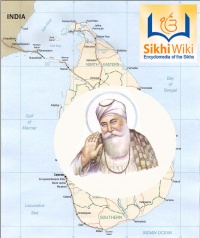Template:AOW197
Guru Nanak, the founder of the Sikh religion, like the Buddha earlier, sowed the seeds of spiritual democracy. The process of its germination and growth is still in progress and continues to flourish due to the Guru's message for the world at large, conveyed through his writings and personal visits to the then known countries of the Asian sub-continent.
This article examine the historical facts relating to Guru Nanak's visit to Sri Lanka. The Guru, possessing neither territory, nor wealth, nor aided by the forces of arms, preached his doctrine of peace in the countries during the course of his travels including Sri Lanka.
It is clear from recent research to conclude that much evidence, in both written and oral traditions, is available with regard to Guru Nanak's travels, beyond the limits of Hindustan, including Sri Lanka, then known as Simhal Dweepa, to spread his message of virtue and righteousness.
A town in Sri Lanka, visited by Guru Nanak Sahib and Bhai Mardana. At the time of the visit of Guru Sahib, Baticulla was known as Matiakullam. Raja Shiv Nabh ruled it. Bhai Mansukh of Lahore had, earlier, visited this town and had told the ruler about Guru Nanak Sahib. When Guru Sahib visited the town, Raja Shiv Nabh’s joy knew no bounds. He requested Guru Sahib to stay at his palace. Guru Sahib visited his palace but stayed at a place, about 20 km from Baticulla, now known as Kurukul Mandap.
This village in Sri Lanka which grew up after the Guru had camped here owes its name to Guru Nanak. Kurukul Mandap is Tamil meaning "Guru's Village." In sanskrit Gurukul means the Guru's house or abode and mandap means tent or pavillion. Local oral traditions tell of a visit by a saintly missionary from the Punjab to this area. According to a tradition Bhai Changa Bhatra a disciple of Guru Nanak's, mentioned in the Janamsakhis, came from this area. .....More

